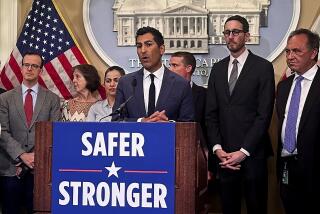House Approves Curbs on Federal Civil Suits : Congress: ‘Losers pay’ measure is designed to spur settlements. It’s the first of three GOP legal reform bills.
- Share via
WASHINGTON — The House approved legislation Tuesday that would take the first major step toward making it tougher to file and win civil lawsuits in cases ranging from securities fraud to personal injuries.
By a vote of 232 to 193, the House passed a measure that would create a “losers pay” system for federal lawsuits in which the litigants are residents of different states. It is designed to encourage contending parties to reach settlements before trial.
The measure, passed largely on a party-line vote, is the first of three major bills offered by House Republicans as the legal reform provision of their “contract with America,” the GOP’s campaign manifesto.
Two other bills are also part of the legal reform package. They are expected to win easy approval later this week. One would require a higher standard for filing securities fraud lawsuits and the other would place strict limits on punitive damages for injuries caused by defective and dangerous products.
Although Republicans control the Senate, too, the legislation could be changed significantly in that chamber before final passage. Some influential Senate Republicans are likely to disagree with some House provisions. And Senate Democrats have the power to delay the legislation through filibusters and other parliamentary maneuvers.
The Republican bills respond to long-sought demands from the business community for relief from what they regard as costly and frivolous lawsuits. The business community was an enthusiastic campaign supporter of the new Republican majority, which was elected in 1994.
Democrats, who historically receive generous contributions from trial lawyers, insist that the measures would strip traditional legal remedies from the victims of fraud, malpractice or defective products, and corporate misdeeds.
The Clinton Administration strongly opposes the GOP plan, claiming that it would cripple the ability to sue by “the middle-income, the elderly, the indigent who need that type of justice, that type of remedy,” said White House Press Secretary Mike McCurry.
Litigation reform was promoted without success during the last two congresses, with much of the impetus coming from the accounting industry, whose major firms made huge payouts during the 1980s to settle lawsuits related to savings and loan association failures. The high-technology industry, often the subject of shareholder lawsuits after stock fluctuations, also sought changes in the law.
But the then-Democratic majority in both houses of Congress opposed major changes in the law. Both Democrats and Republicans agree that the bills, if they become law, would be a major departure from the current legal system, placing a significantly greater burden of proof on plaintiffs who bring lawsuits.
“All too often, in the name of righting wrongs, our current system creates new injustices--hurting people who may be completely innocent of wrongdoing, and who may be guilty of no more than working hard every day at their jobs,” said Rep. Christopher Cox (R-Newport Beach), chairman of the House Republican policy conference and prime author of the securities litigation bill. “These injustices have to stop.”
Current law requires each side to pay its legal fees. Under the measure approved Tuesday, a party in a federal court case who rejects a settlement before trial and loses, would be required to pay the other side’s legal fees.
This would apply to cases filed in federal court, with a claim of more than $50,000 where the parties are from different states. The loser-pays provision is designed to encourage settlement rather than having cases go to trial.
The bill also would place new limits on so-called expert testimony, which could be admitted only when the judge rules that the expert opinion is “scientifically valid and reliable.” And it would provide sanctions for lawyers who make frivolous arguments or harass the other side or needlessly increase the cost of the case through delays.
After the initial bill’s passage on Tuesday, Rep. Ron Packard (R-Oceanside) declared that it will “send unscrupulous attorneys the message that our court system exists to administer justice--not rack up billable hours.”
He compared the current judicial system to an automobile engine and said that House Republicans “are getting under the hood and cleaning out the system to make it run more smoothly and fairly.”
The measure was approved easily on a party-line vote. It was backed by 216 Republicans and 16 Democrats. The opposition included 181 Democrats, 11 Republicans and the single House Independent, Bernard Sanders of Vermont.
During the debate, the House rejected amendments to exempt civil rights cases from the new restrictions and to limit the legislation’s impact to companies with fewer than 500 workers.
The House is expected to vote today on the securities litigation section of the Republican program. It is designed to deter frivolous filing of cases against high-tech companies whose stock is often volatile, according to supporters.
Plaintiffs would be required to prove that the defendants knowingly and intentionally made fraudulent statements, a tougher standard than under current law.
Opponents said that much of the information about a defendant’s misconduct is not available until the “discovery” stage of the case. They said that the proposed bill would stop the cases from reaching discovery.
The third major Republican legal reform bill would limit punitive damages in most civil lawsuits for injury claims to either $250,000 or three times the economic damages, whichever is greater.
For example, if a tanker spilled oil on the California coastline, and the economic damages totaled $1 million--in the cost of cleanup and lost business and lost wages--the punitive damages would be limited to $3 million. Currently, juries can decide how much to award for punitive damages, subject to a judge’s ruling or an appeal.
The same rule limiting financial awards would apply to an individual who suffers an injury from a particular product.
This liability section would apply to civil cases in both federal and state courts, and will be the most controversial part of the legislative package because it would deal with cases covering the vast array of consumer and industrial products, as well as the full range of corporate activity subject to consumer complaints.
Deep pockets lobbying has been fierce on Capitol Hill, accompanied by newspaper advertising and television commercials. Backing the Republican measures are the accounting and securities industries, the U.S. Chamber of Commerce, California’s high-technology industry, and the National Assn. of Manufacturers.
The opponents include the National Assn. of Securities & Commercial Law Attorneys, the AFL-CIO, Consumers Union, the National Assn. of States Securities Administrators, and the American Assn. of Retired Persons.
More to Read
Get the L.A. Times Politics newsletter
Deeply reported insights into legislation, politics and policy from Sacramento, Washington and beyond. In your inbox twice per week.
You may occasionally receive promotional content from the Los Angeles Times.










